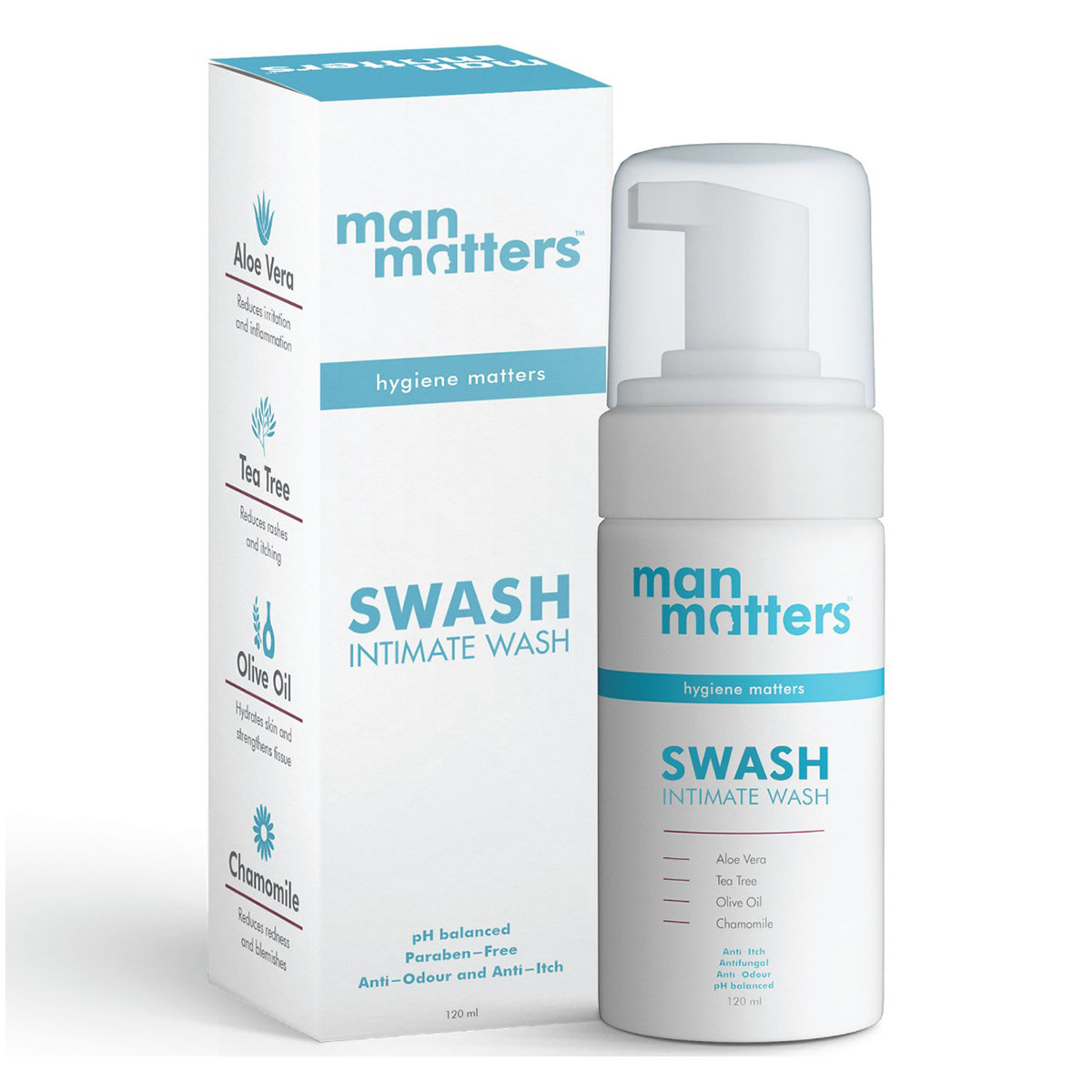Trofame XR Capsule
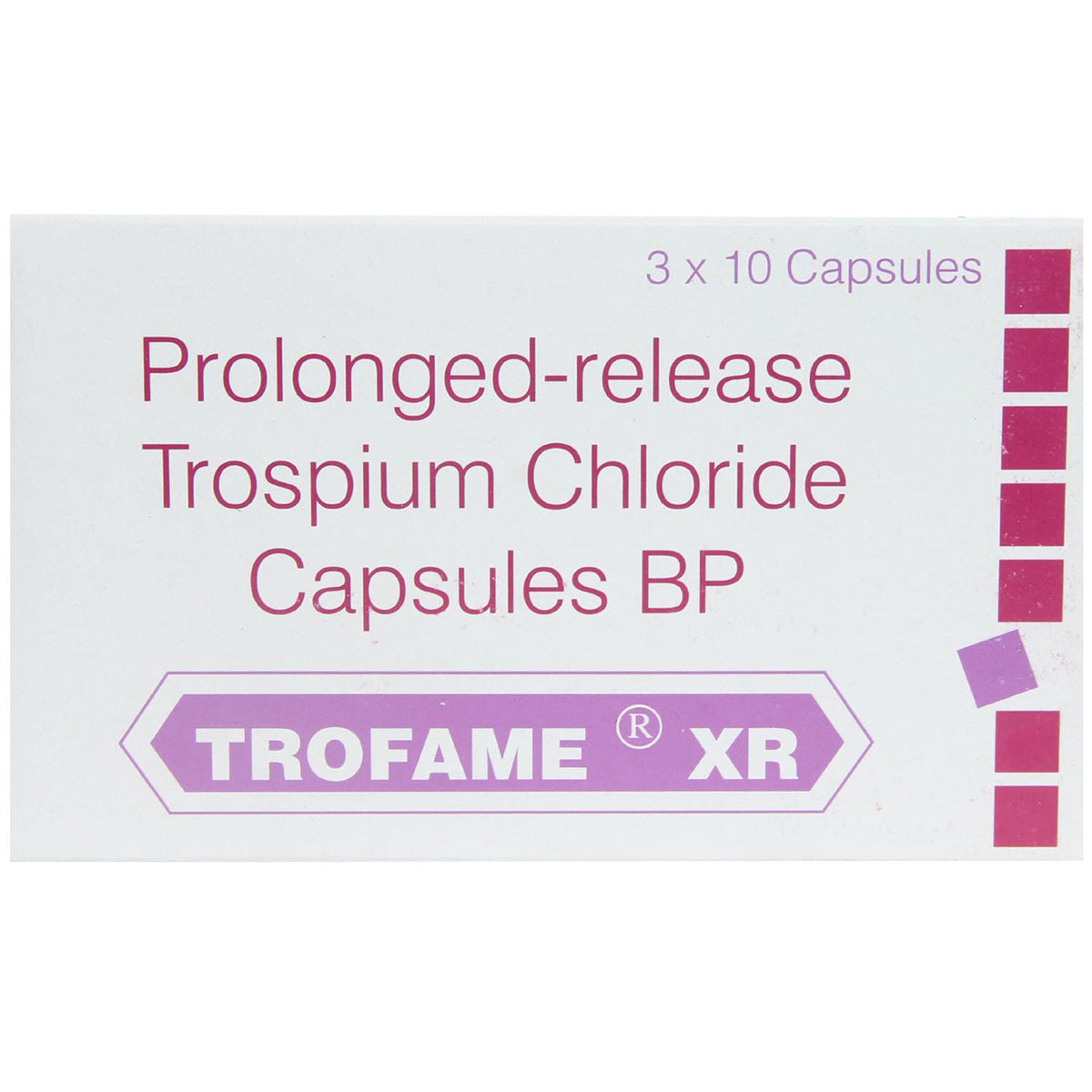
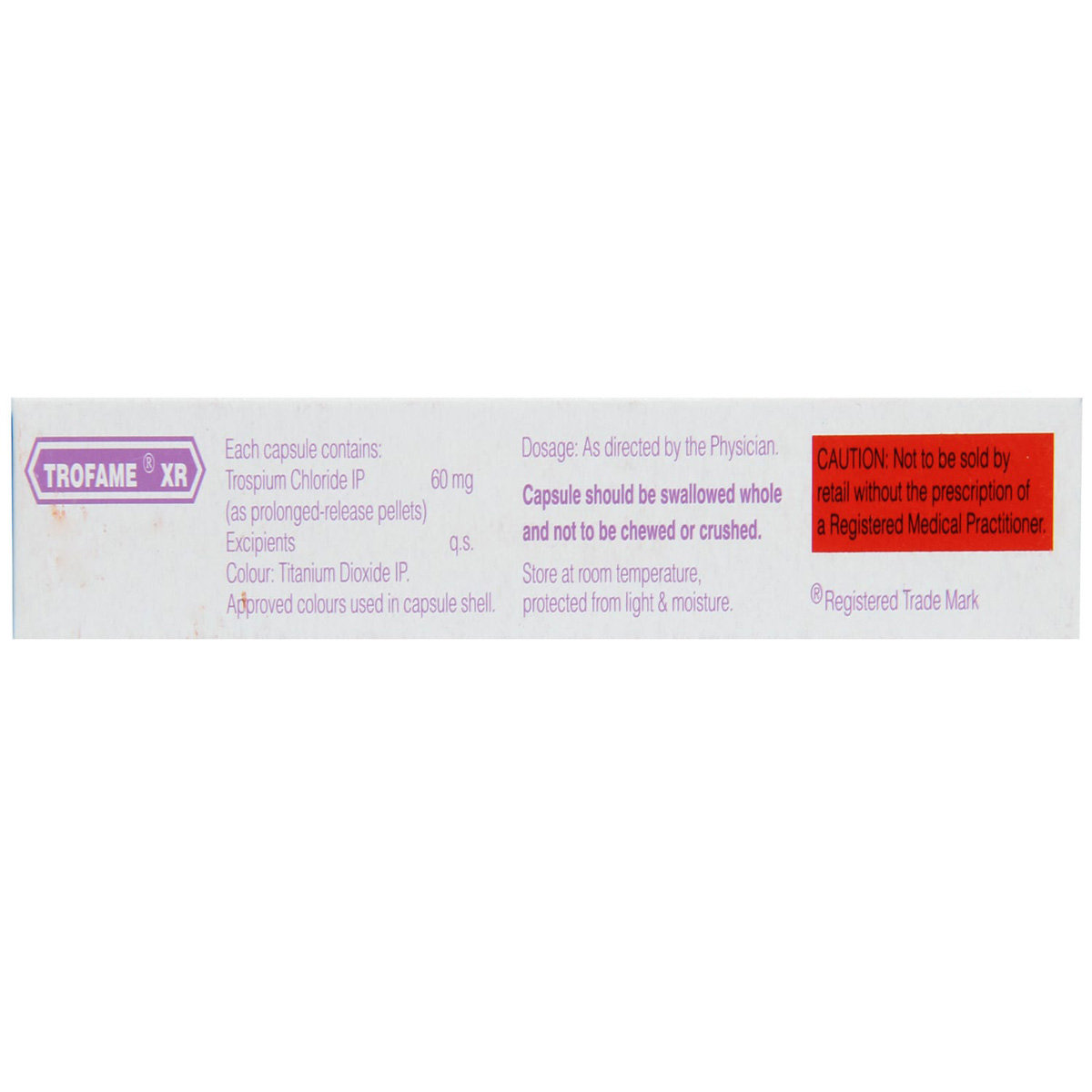
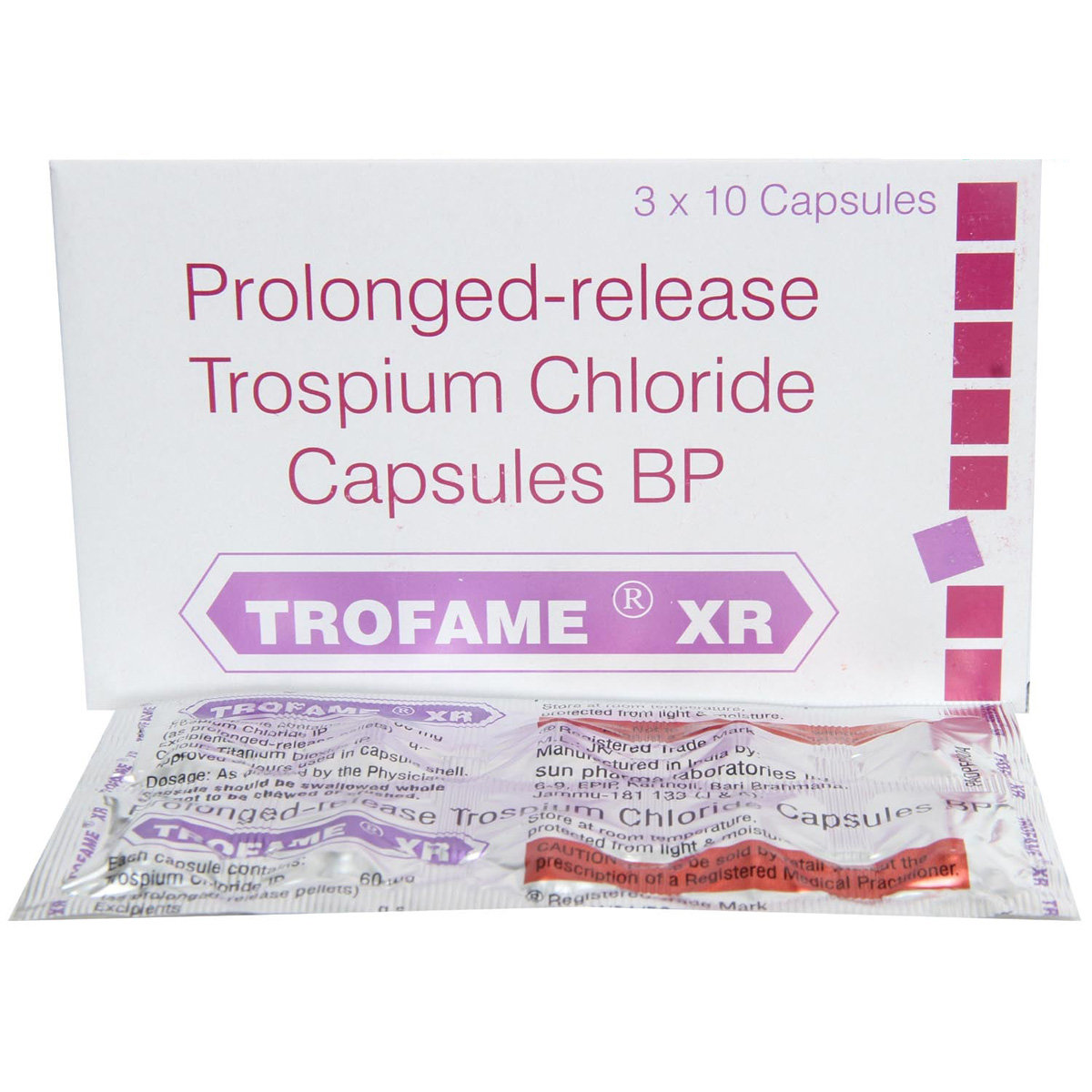
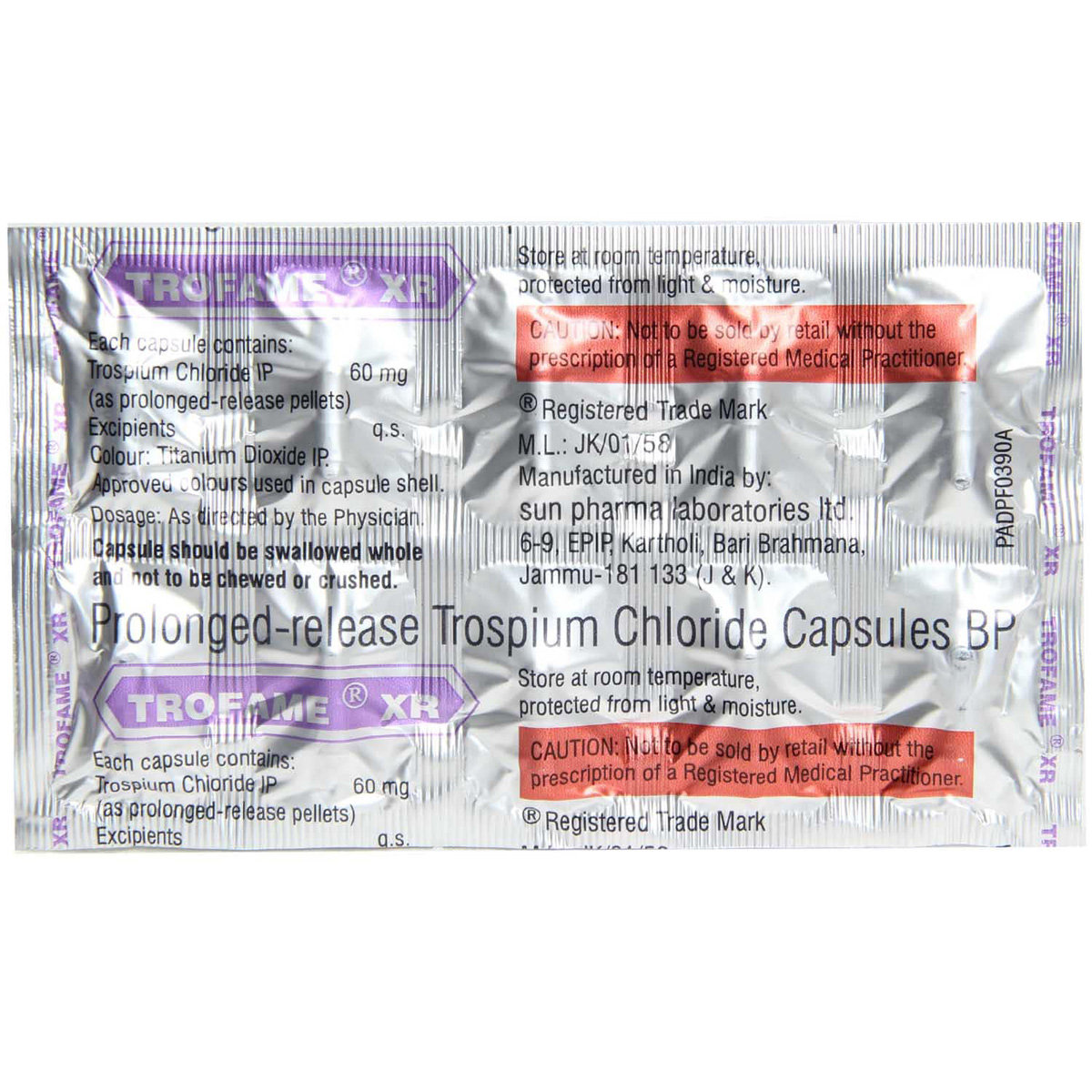
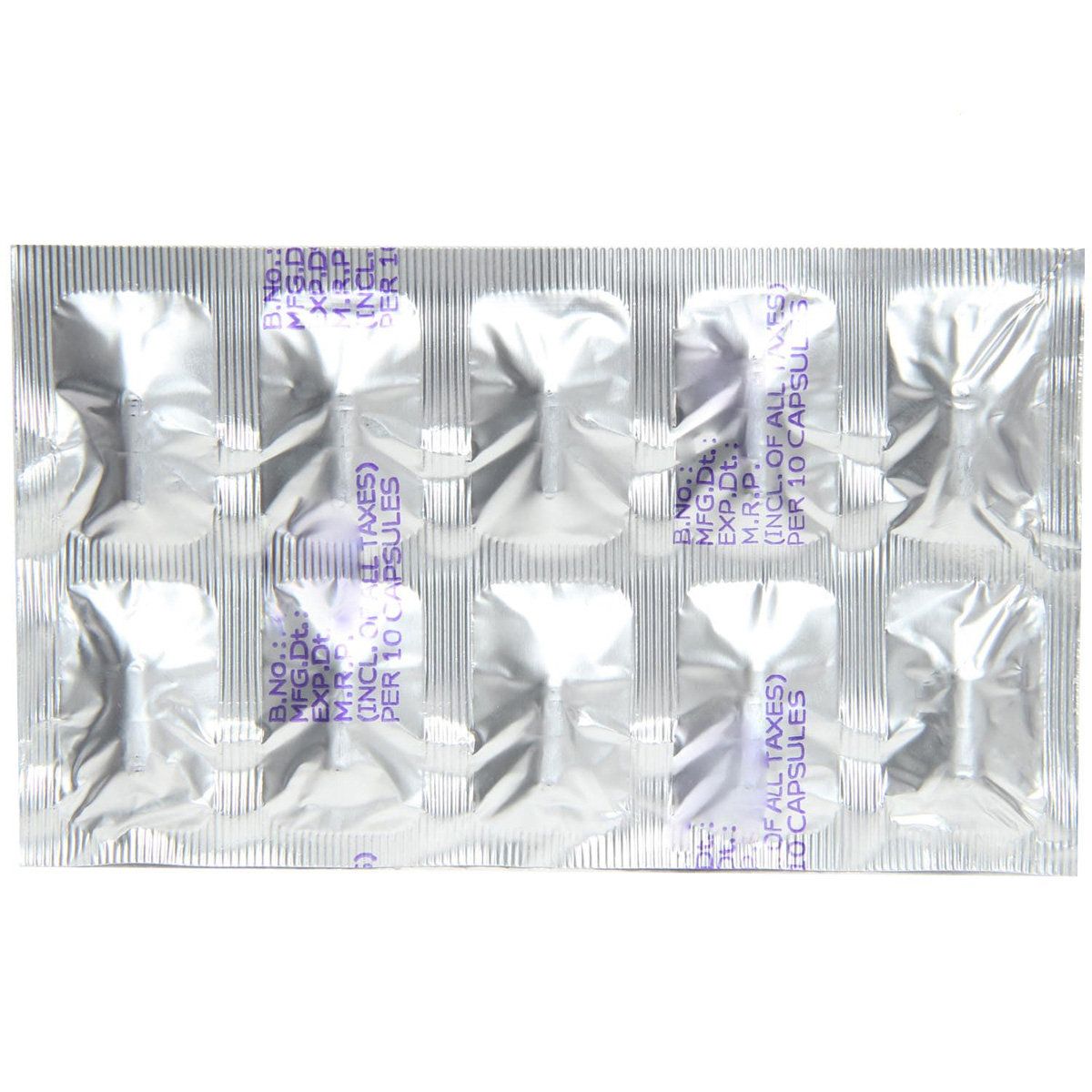
MRP ₹325
(Inclusive of all Taxes)
₹48.8 Cashback (15%)
know your delivery time
Provide Delivery Location
Composition :
Manufacturer/Marketer :
Consume Type :
Expires on or after :
Return Policy :

Secure Payment

Trusted by 8 Crore Indians

Genuine Products
Therapeutic Class
Country of origin
Manufacturer/Marketer address
Author Details
We provide you with authentic, trustworthy and relevant information
Disclaimer
Alcohol
Safe if prescribed
You are recommended to avoid consumption of alcohol with Trofame XR Capsule as it may increase the risk of adverse effects of Trofame XR Capsule .
Pregnancy
Consult your doctor
Trofame XR Capsule is a category C pregnancy drug and is given to pregnant women only if the doctor thinks benefits outweigh risks. However, please consult a doctor if you are pregnant.
Breast Feeding
Consult your doctor
It is unknown whether Trofame XR Capsule is excreted in human milk. Therefore, please consult a doctor if you are breastfeeding. Trofame XR Capsule is given to breastfeeding mothers only if the doctor thinks benefits are greater than risks.
Driving
Safe if prescribed
Trofame XR Capsule may cause blurred vision in some people. Therefore, wait until your vision is clear before driving or operating heavy machinery.
Liver
Consult your doctor
Take Trofame XR Capsule with caution, especially if you have a history of Liver diseases/conditions. The dose may be adjusted by your doctor as required. Avoid taking Trofame XR Capsule if you have severe liver disease.
Kidney
Consult your doctor
Take Trofame XR Capsule with caution, especially if you have a history of Kidney diseases/conditions. The dose may be adjusted by your doctor as required.
Children
Safe if prescribed
Trofame XR Capsule is not recommended for children below 12 years as the safety and effectiveness were not established.
About Trofame XR Capsule
Trofame XR Capsule belongs to the class of drugs called antimuscarinics used to treat overactive bladder (OAB) symptoms. Overactive bladder is a problem with bladder function that causes a sudden urge to urinate. Overactive bladder symptoms include frequent urination, involuntary loss of urine, an urgent and uncontrollable need to urinate, or bedwetting.
Trofame XR Capsule contains Trospium which works by blocking muscarinic receptors on the surface of muscle cells and inhibits the action of acetylcholine (a chemical messenger) that causes contraction of the bladder muscle. Thereby, Trofame XR Capsule relaxes the involuntary muscle (detrusor) in the bladder wall and reduces unstable and involuntary contractions of the bladder, and increases the bladder's capacity to hold urine. Thus, it decreases the need to urinate.
Take Trofame XR Capsule as prescribed by your doctor. You are advised to take Trofame XR Capsule for as long as your doctor has prescribed it for you based on your medical condition. In some cases, you may experience dry mouth, nausea, stomach pain, indigestion, or constipation. Most of these side effects of Trofame XR Capsule do not require medical attention and gradually resolve over time. However, if the side effects persist or worsen, please consult your doctor.
If you are allergic to Trofame XR Capsule or any other medicines, please tell your doctor. Trofame XR Capsule is not recommended for children below 12 years as the safety and effectiveness were not established. Please consult a doctor if you are pregnant or breastfeeding before taking Trofame XR Capsule . Do not consume alcohol with Trofame XR Capsule as it may increase the risk of adverse effects. You are recommended to drink plenty of water while taking Trofame XR Capsule to prevent dryness of the mouth. Drive only if your vision is clear after taking Trofame XR Capsule as it may cause blurred vision in some people for a short duration.
Uses of Trofame XR Capsule
Medicinal Benefits Mweb
Key Benefits
Trofame XR Capsule contains Trospium used to treat overactive bladder symptoms. Trofame XR Capsule blocks muscarinic receptors on the muscle cells and inhibits the action of acetylcholine (a chemical messenger) that causes contraction of the bladder muscle. Thereby, Trofame XR Capsule relaxes the involuntary muscle (detrusor) in the bladder wall and reduces unstable and involuntary contractions of the bladder and increases bladder capacity to hold urine. Thus, it decreases the need to urinate.
Directions for Use
Side Effects of Trofame XR Capsule
- Dry mouth
- Nausea
- Stomach pain
- Indigestion
- Constipation
Drug Warnings
If you are allergic to Trofame XR Capsule or any other medicines, please tell your doctor. If you have nerve damage, overactive thyroid, hernia of the diaphragm with inflammation of the esophagus, liver, kidney, or heart problems, inform your doctor before taking Trofame XR Capsule . Trofame XR Capsule is not recommended for children below 12 years as the safety and effectiveness were not established. Please consult a doctor if you are pregnant or breastfeeding before taking Trofame XR Capsule . Do not consume alcohol with Trofame XR Capsule as it may increase the risk of adverse effects. You are recommended to drink plenty of water while taking Trofame XR Capsule to prevent dryness of the mouth. Avoid taking Trofame XR Capsule if you have urinary retention, serious liver disorder, narrow-angle glaucoma, irregular heartbeats, myasthenia gravis (muscle weakness), and toxic megacolon (severe gastrointestinal condition). Drive only if your vision is clear after taking Trofame XR Capsule as it may cause blurred vision in some people for a short duration.
Drug-Drug Interactions
Drug-Drug Interactions
Login/Sign Up
Taking Trofame XR Capsule with Potassium chloride can increase the risk of stomach ulcers.
How to manage the interaction:
Taking Trofame XR Capsule with Potassium chloride is not recommended as it may lead to an interaction, it can be taken if prescribed by the doctor. However, if you experience severe stomach pain, bloating, sudden lightheadedness or dizziness, nausea, vomiting (especially with blood), decreased hunger, or dark, tarry stools, consult the doctor immediately. Do not discontinue any medications without a doctor's advice.
Taking Potassium citrate and Trofame XR Capsule together can increase the risk of stomach ulcers, bleeding, and gastrointestinal injury.
How to manage the interaction:
Taking Trofame XR Capsule with Potassium citrate is not recommended as it may lead to an interaction, it can be taken if prescribed by the doctor. However, if you experience severe stomach pain, bloating, sudden lightheadedness or dizziness, nausea, vomiting (especially with blood), decreased hunger, or dark, tarry stools, consult the doctor immediately. Do not discontinue any medications without a doctor's advice.
Coadministration of Trofame XR Capsule with Zonisamide can increase the risk or severity of Zonisamide side effects like increased body temperature and decreased sweating.
How to manage the interaction:
Taking Trofame XR Capsule with Zonisamide together can result in an interaction, but it can be taken if your doctor has advised it. However, if you experience changes in blood pressure, increased heart rate, fever, or excessive sweating, contact a doctor immediately. Make sure to hydrate yourself during warm weather or after exercise. Do not discontinue any medications without consulting a doctor.
Taking Trofame XR Capsule with Topiramate can cause increase in body temperature and decrease sweating.
How to manage the interaction:
Although taking Trofame XR Capsule and Topiramate together can evidently cause an interaction, but it should be taken if your doctor has suggested it. However, if you experience feeling sweating, feeling very tired, dizzy or lightheaded, or having trouble thinking clearly contact your doctor immediately. Do not stop using any medications without a doctor's advice.
Using Trofame XR Capsule together with procainamide may increase the blood levels and effects of both the drugs.
How to manage the interaction:
There may be a possibility of interaction between Trofame XR Capsule and Procainamide, but it can be taken if prescribed by a doctor. However, if you experience any unusual symptoms contact your doctor immediately. Do not stop using any medications without a doctor's advice.
Drug-Food Interactions
Drug-Food Interactions
Login/Sign Up
Drug-Diseases Interactions
Drug-Diseases Interactions
Login/Sign Up
Drug-Drug Interactions Checker List
- IMIPRAMINE
- AMITRIPTYLINE
- SALBUTAMOL
- METOCLOPRAMIDE
- COLESTIPOL
- CHOLESTYRAMINE
- MIRABEGRON
- ACETAMINOPHEN
- METOPROLOL
- DIPHENHYDRAMINE
Habit Forming
Special Advise
Please consult a doctor if the condition persists or worsens after using Trofame XR Capsule for 1 month.
Diet & Lifestyle Advise
- Pelvic floor exercises would help treat bladder spasms.
- Avoid foods like sugars, carbonated beverages, tea, citrus fruits, tomatoes, spicy foods, chocolate and tea.
- Limit fluid intake as excess fluid intake could cause an urge to urinate frequently.
- Avoid drinking excess alcohol or caffeinated drinks as they can worsen the symptoms.
- Maintain a healthy weight, and exercise regularly.
- Avoid smoking and alcohol intake.
- Take 6-8 glasses of liquids every day.
- Avoid processed foods. Instead, choose whole, unprocessed foods.
- Include fruits, vegetables, and fiber-rich food in your diet.

Have a query?
Buy best Genito Urinary products by
Cipla Ltd
Sun Pharmaceutical Industries Ltd
Intas Pharmaceuticals Ltd
Ipca Laboratories Ltd
Leeford Healthcare Ltd
Dr Reddy's Laboratories Ltd
Lupin Ltd
Alkem Laboratories Ltd
Msn Laboratories Pvt Ltd
Zydus Healthcare Ltd
Demorbus India Pvt Ltd
Mankind Pharma Pvt Ltd
Overseas Health Care Pvt Ltd
RPG Life Sciences Ltd
La Renon Healthcare Pvt Ltd
Alembic Pharmaceuticals Ltd
Corona Remedies Pvt Ltd
Macleods Pharmaceuticals Ltd
Aristo Pharmaceuticals Pvt Ltd
Fourrts India Laboratories Pvt Ltd
Tas Med India Pvt Ltd
Micro Labs Ltd
Samarth Life Sciences Pvt Ltd
Zydus Cadila
Emcure Pharmaceuticals Ltd
Hetero Drugs Ltd
Ignyx Pharmaceuticals
Renspur Healthcare Pvt Ltd
Steris Healthcare
Alniche Life Sciences Pvt Ltd
Septalyst Lifesciences Pvt Ltd
Ajanta Pharma Ltd
Elder Pharmaceuticals Ltd
Merynova Life Sciences India Pvt Ltd
Tppl Pharmaceuticals Pvt Ltd
Walter Bushnell
Aar Ess Remedies Pvt Ltd
Knoll Healthcare Pvt Ltd
Lividus Pharmaceuticals Pvt Ltd
Meditrex Pharma
Medrhans Pharmaceuticals Pvt Ltd
Neuten HealthCare
Redmed Medical Services
Talohsty Medmark Pvt Ltd
Zycris Healthcare
East West Pharma India Pvt Ltd
Globus Remedies Ltd
Golden Square Lab Pvt Ltd
Hetero Healthcare Pvt Ltd
Modi Mundipharma Pvt Ltd
Nephurocare Pharma Pvt Ltd
Pfizer Ltd
TTK Healthcare Ltd
Votary Laboratories (India) Ltd
Albus Healthcare Pvt Ltd
Delvin Formulations (P) Ltd
Indoco Remedies Ltd
Intra Life Pvt Ltd
Megma Healthcare Pvt Ltd
Morepen Laboratories Ltd
Qren Life Sciences Pvt Ltd
Steadfast MediShield Pvt Ltd
Unipark Biotech Pvt Ltd
Akumentis Healthcare Ltd
Biokindle Lifesciences Pvt Ltd
Calren Care Lifesciences Pvt Ltd
Chemo Biological Ltd
Chemo Healthcare Pvt Ltd
Euniche Life Sciences
Himeros Pharmaceuticals Pvt Ltd
Hospimax Healthcare Pvt Ltd
Kiosence Health Care Pvt Ltd
Lia Life Sciences Pvt Ltd
Panacea Biotec Ltd
Primus Remedies Pvt Ltd
Rencord Life Sciences Pvt Ltd
Shilpa Medicare Ltd
Stadmed Pvt Ltd
Abbott India Ltd
Ameya Pharmaceuticals & Chemicals Pvt Ltd
Ardent Life Sciences Pvt Ltd
Asterima Pharmaceuticals Pvt Ltd
Astrum Healthcare Pvt Ltd
Cadila Healthcare Ltd
De Renon
Fibovil Pharmaceuticals Pvt Ltd
Koye Pharmaceuticals Pvt Ltd
Linux Laboratories Pvt Ltd
MMC Healthcare Ltd
Neovae Biomedics Pvt Ltd
Olcare Laboratories Pvt Ltd
Oxygen Pharma Care Pvt Ltd
Prevego Healthcare & Research Pvt Ltd
Rene Lifescience
Sanzyme Pvt Ltd
Solis Ortus Remedies Pvt Ltd
Syndicate Life Sciences Pvt Ltd
Tycoon Pharmaceuticals Pvt Ltd
Vasu Organics Pvt Ltd
Walron Health Care Pvt Ltd
Frequently Bought Together







